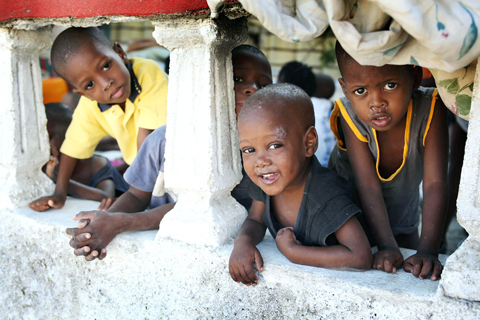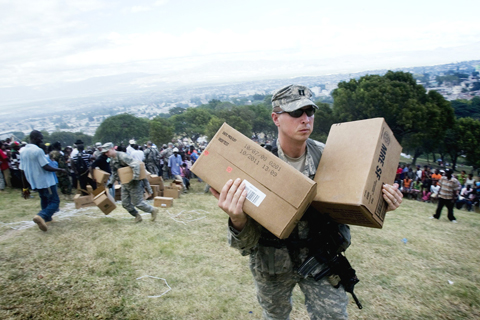Rescue teams clawed through the rubble of Port-au-Prince for the fifth straight day yesterday still dragging out earthquake survivors even as bodies piled up and the UN said it had never confronted such a huge disaster.
Amid new anger over the relief operations, some Haitians fought for the rations that are getting through while others carried the injured on their backs or on carts to emergency hospitals.
Though survivors are still being dragged out, the true scale of the disaster is slowly beginning to emerge. UN Secretary-General Ban Ki-moon called the quake the “most serious humanitarian crisis” to face the world body in decades as he left for Port-au-Prince.

PHOTO: AFP
Between 20,000 and 30,000 people died just in the town of Leogane, west of the capital and the epicenter of the magnitude 7.0 quake which struck on Tuesday, UN officials said. The Haitian government has estimated about 50,000 dead so far and this has been backed by the UN.
Street after street of Leogane was flattened.
The Medecins Sans Frontiers (Doctors Without Borders, MSF) aid group opened an emergency hospital at Carrefour, a poor district near Leogane. MSF emergency coordinator Hans van Dillen said crowds arrived almost immediately.

PHOTO: REUTERS
“Patients arrived on handcarts or on men’s backs. There are other hospitals in the area, but they are already unable to cope with the number of injured and have limited resources of personnel and medicines and equipment,” he said.
MSF said their doctors and surgeons had been working around the clock, amputating limbs and performing caesarian sections on pregnant women.
Most bodies are now being pushed into mass graves outside the capital to prevent the spread of disease. However, intensive efforts are being pursued to find survivors.
UN Office for the Coordination of Humanitarian Affairs spokeswoman Elisabeth Byrs said that 12 more people were pulled out alive from debris on Saturday, taking the total to more than 70 since the teams started working.
“We don’t give up hope to find more survivors,” Byrs stressed. “The morale of the rescue team is very high despite the hardship.”
Some 43 international teams comprising of 1,739 rescue workers and 161 dogs have already scoured 60 percent of the worst affected areas hit by the quake. About 10,000 US troops are being sent to assist and secure the stricken areas.
Byrs said the way buildings had collapsed left “sufficient void spaces that allow for trapped victims to remain alive.”
“There is still hope. The conditions are very favorable. It’s exceptional and thank God for that,” she said.
But Rami Peltz, a rescuer with an Israeli team, said: “Today is the last day that I think we will be able to find survivors, mainly because of dehydration.”
And the UN also warned over the scope of the work ahead.
“We have never been confronted with such a disaster in the UN memory. It is like no other,” Byrs said on Saturday.
The UN chief said “I am going to Haiti with a very heavy heart.”
US military helicopters crews unloaded boxes of vital supplies as massive lines formed at distribution points where the UN World Food Programme handed out high-energy food.
A journalist saw one US helicopter dropping a half-dozen small cartons into a stadium of starving Haitians, some brandishing machetes as they fought over the items.
Two Dominicans were shot and seriously wounded as they handed out aid, Dominican media reported. Carlos Gatas and Milton Matos struggled back to the Dominican Republic embassy with gunshot wounds after the apparent attack.
The UN said increasing numbers of Haitians were trying to cross the border into the Dominican Republic, on the eastern side of Hispaniola island, and reported a surge of quake survivors fleeing to northern cities.
US Secretary of State Hillary Clinton became the highest-ranking US official to visit Haiti since the quake and highlighted the urgent need to clear logistical hurdles.
“You have been severely tested, but I believe that Haiti can come back even stronger and better in the future,” she told Haitians.
Former US presidents Bill Clinton and George W. Bush, named by the White House as special coordinators of aid to Haiti, launched an appeal to raise tens of millions of dollars for the stricken country.
The president of Senegal called on Africa to give Haitian quake victims land to restart their lives on the continent where their ancestors were snatched as slaves.
“It is our duty to recognize their right to come back to the land of their ancestors,” Senegalese President Abdoulaye Wade told France Info radio, while his aides said land could be found for Haitians who go to Africa.
In other news, anger built yesterday at Haiti’s US-controlled main airport, where aid flights were still being turned away and poor coordination continued to hamper the relief effort four days on.
Control remained in the hands of US forces, who face criticism for the continued disarray at the overwhelmed airfield.
Crowds accused US forces, who were handed control of the airport by Haitian authorities, of monopolizing the airfield’s single runway to evacuate US citizens.
The US embassy denied it was putting the evacuation of the approximately 40,000 to 45,000 US citizens in the country first.

LIMITS: While China increases military pressure on Taiwan and expands its use of cognitive warfare, it is unwilling to target tech supply chains, the report said US and Taiwan military officials have warned that the Chinese People’s Liberation Army (PLA) could implement a blockade within “a matter of hours” and need only “minimal conversion time” prior to an attack on Taiwan, a report released on Tuesday by the US Senate’s China Economic and Security Review Commission said. “While there is no indication that China is planning an imminent attack, the United States and its allies and partners can no longer assume that a Taiwan contingency is a distant possibility for which they would have ample time to prepare,” it said. The commission made the comments in its annual

DETERMINATION: Beijing’s actions toward Tokyo have drawn international attention, but would likely bolster regional coordination and defense networks, the report said Japanese Prime Minister Sanae Takaichi’s administration is likely to prioritize security reforms and deterrence in the face of recent “hybrid” threats from China, the National Security Bureau (NSB) said. The bureau made the assessment in a written report to the Legislative Yuan ahead of an oral report and questions-and-answers session at the legislature’s Foreign Affairs and National Defense Committee tomorrow. The key points of Japan’s security reforms would be to reinforce security cooperation with the US, including enhancing defense deployment in the first island chain, pushing forward the integrated command and operations of the Japan Self-Defense Forces and US Forces Japan, as

IN THE NATIONAL INTEREST: Deputy Minister of Foreign Affairs Francois Wu said the strengthening of military facilities would help to maintain security in the Taiwan Strait Japanese Minister of Defense Shinjiro Koizumi, visiting a military base close to Taiwan, said plans to deploy missiles to the post would move forward as tensions smolder between Tokyo and Beijing. “The deployment can help lower the chance of an armed attack on our country,” Koizumi told reporters on Sunday as he wrapped up his first trip to the base on the southern Japanese island of Yonaguni. “The view that it will heighten regional tensions is not accurate.” Former Japanese minister of defense Gen Nakatani in January said that Tokyo wanted to base Type 03 Chu-SAM missiles on Yonaguni, but little progress

NO CHANGES: A Japanese spokesperson said that Tokyo remains consistent and open for dialogue, while Beijing has canceled diplomatic engagements A Japanese official blasted China’s claims that Japanese Prime Minister Sanae Takaichi has altered Japan’s position on a Taiwan crisis as “entirely baseless,” calling for more dialogue to stop ties between Asia’s top economies from spiraling. China vowed to take resolute self-defense against Japan if it “dared to intervene militarily in the Taiwan Strait” in a letter delivered Friday to the UN. “I’m aware of this letter,” said Maki Kobayashi, a senior Japanese government spokeswoman. “The claim our country has altered its position is entirely baseless,” she said on the sidelines of the G20 summit in Johannesburg on Saturday. The Chinese Ministry